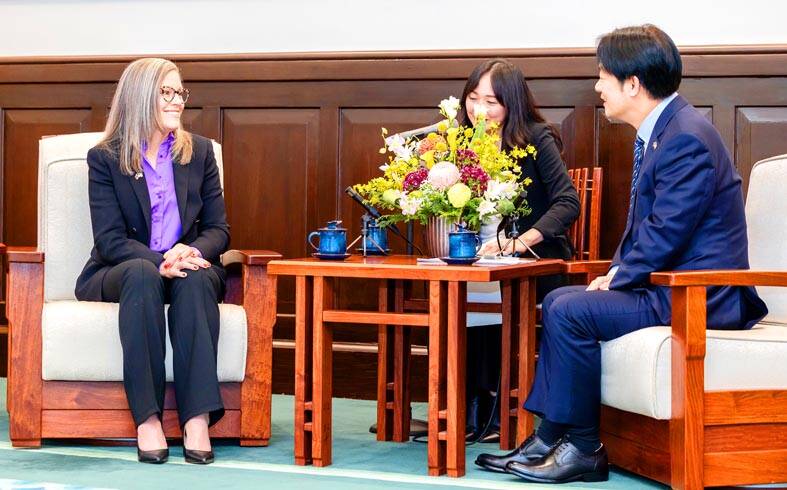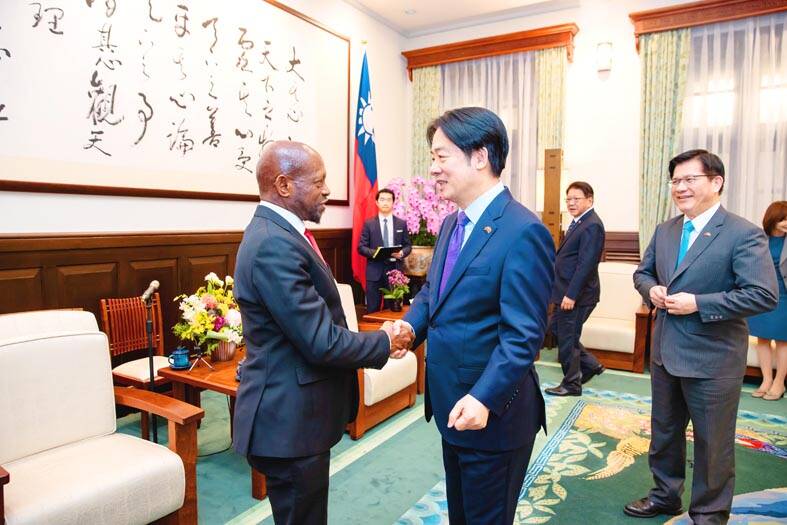Taiwan Semiconductor Manufacturing Co’s (TSMC) continued expansion in Arizona would become a model of technology cooperation between Taiwan and the US, President William Lai (賴清德) said on Tuesday.
Speaking at a meeting with a delegation led by Arizona Governor Katie Hobbs in Taipei, Lai said Taiwan’s ties with Arizona had seen “significant progress,” marked by TSMC’s investment in the state.
He was referring to TSMC’s previous commitments between 2020 and last year to invest US$65 billion in three chip foundries in Arizona, one of which has begun operations, and its pledge to invest another US$100 billion to build three more foundries, a research and development center, and two packaging facilities in the state.

Photo: screen grab from the Presidential Office’s Flickr page
Lai said he believed that by continuing to work together, Arizona would become the “best model” of bilateral cooperation on advanced technology and efforts to build a “non-red” supply chain, referring to a network of industries free from Chinese involvement.
Hobbs said that TSMC’s venture would not only contribute to the global advancement of artificial intelligence and other technologies, but also strengthen bilateral ties, according to a statement provided by the Presidential Office following the meeting.
The governor, who assumed office in 2023 and is in Taiwan for the second time in her official capacity, also noted the shared values, and cultural and education exchanges between the two sides.

Photo: screen grab from the Presidential Office’s Flickr page
Hobbs’ delegation was visiting Taiwan until yesterday after arriving on Sunday to meet with representatives of the Ministry of Economic Affairs, TSMC and other enterprises, the Ministry of Foreign Affairs said.
Lai on Tuesday also met with Saint Kitts and Nevis Minister of Foreign Affairs Denzil Douglas at the Presidential Office in Taipei.
Lai noted longstanding collaborations between Taiwan and the Caribbean ally in areas such as education, agriculture, women’s empowerment and environmental protection and said the two nations should continue to support each other on the global stage and promote more exchanges that benefit their people.
Douglas, who is visiting Taiwan until tomorrow, said Saint Kitts and Nevis would continue to champion Taiwan’s international participation and advocate peace across the Taiwan Strait, a Presidential Office statement said.

Taiwan yesterday condemned the recent increase in Chinese coast guard-escorted fishing vessels operating illegally in waters around the Pratas Islands (Dongsha Islands, 東沙群島) in the South China Sea. Unusually large groupings of Chinese fishing vessels began to appear around the islands on Feb. 15, when at least six motherships and 29 smaller boats were sighted, the Coast Guard Administration (CGA) said in a news release. While CGA vessels were dispatched to expel the Chinese boats, Chinese coast guard ships trespassed into Taiwan’s restricted waters and unsuccessfully attempted to interfere, the CGA said. Due to the provocation, the CGA initiated an operation to increase

CHANGING LANDSCAPE: Many of the part-time programs for educators were no longer needed, as many teachers obtain a graduate degree before joining the workforce, experts said Taiwanese universities this year canceled 86 programs, Ministry of Education data showed, with educators attributing the closures to the nation’s low birthrate as well as shifting trends. Fifty-three of the shuttered programs were part-time postgraduate degree programs, about 62 percent of the total, the most in the past five years, the data showed. National Taiwan Normal University (NTNU) discontinued the most part-time master’s programs, at 16: chemistry, life science, earth science, physics, fine arts, music, special education, health promotion and health education, educational psychology and counseling, education, design, Chinese as a second language, library and information sciences, mechatronics engineering, history, physical education

The Chinese military has boosted its capability to fight at a high tempo using the element of surprise and new technology, the Ministry of National Defense said in the Quadrennial Defense Review (QDR) published on Monday last week. The ministry highlighted Chinese People’s Liberation Army (PLA) developments showing significant changes in Beijing’s strategy for war on Taiwan. The PLA has made significant headway in building capabilities for all-weather, multi-domain intelligence, surveillance, operational control and a joint air-sea blockade against Taiwan’s lines of communication, it said. The PLA has also improved its capabilities in direct amphibious assault operations aimed at seizing strategically important beaches,

‘MALIGN PURPOSE’: Governments around the world conduct espionage operations, but China’s is different, as its ultimate goal is annexation, a think tank head said Taiwan is facing a growing existential threat from its own people spying for China, experts said, as the government seeks to toughen measures to stop Beijing’s infiltration efforts and deter Taiwanese turncoats. While Beijing and Taipei have been spying on each other for years, experts said that espionage posed a bigger threat to Taiwan due to the risk of a Chinese attack. Taiwan’s intelligence agency said China used “diverse channels and tactics” to infiltrate the nation’s military, government agencies and pro-China organizations. The main targets were retired and active members of the military, persuaded by money, blackmail or pro-China ideology to steal